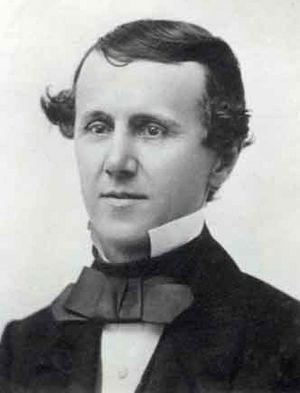Winthrop Sargent Gilman facts for kids
Winthrop Sargent Gilman (born March 28, 1808 – died October 1, 1884) was an important American banker. He led a banking company called Gilman, Son & Co. in New York City. Winthrop was born in Ohio, but his family came from New England. They had already started the banking business in New York. Winthrop became a successful businessman in the Midwest.
While living in Alton, Illinois, in the 1830s, he managed several stores. Many of these were in St. Louis, Missouri. Gilman was an abolitionist, meaning he was against slavery. On November 7, 1837, he helped protect one of his warehouses. He had allowed a newspaper publisher named Elijah Parish Lovejoy to hide a printing press there. This press was for Lovejoy's anti-slavery newspaper, the Alton Observer. A group of people who supported slavery attacked the warehouse. Sadly, Lovejoy was killed during this event. After this, Gilman and his family moved to New York City. There, he joined his family's banking business. He lived and worked in the New York area for the rest of his life.
Contents
Early Life and Business Beginnings
Winthrop Sargent Gilman was born in 1808 in Marietta, Ohio. His parents were Benjamin Ives Gilman and Hannah (Robbins) Gilman. His father, Benjamin, was a merchant born in 1766 in Exeter, New Hampshire. Winthrop's ancestors were among the first important settlers in that area. His father also graduated from Phillips Exeter Academy, a well-known private school.
Gilman started his business career in St. Louis, Missouri. He was a merchant who owned large grocery stores and other related businesses. He lived across the Mississippi River in Alton, Illinois. Illinois was a free state, meaning slavery was not allowed there. He had a warehouse in Alton with his business partner, Godfrey.
Supporting the Abolitionist Movement
Winthrop Gilman strongly supported the movement to end slavery. He allowed the publisher Elijah Parish Lovejoy to hide a new printing press in his Alton warehouse. Lovejoy had already had three of his presses destroyed by people who were against his anti-slavery views. During a riot, an angry mob attacked Gilman's warehouse. They killed Lovejoy and burned the warehouse to the ground.
Before the American Civil War, Gilman moved to New York City. He then joined his family's banking business. His company, Gilman, Son & Co., often worked with the powerful Brown family from Providence, Rhode Island. The Brown family founded Brown University. Later, John Nicholas Brown and the Gilman Land Company helped develop areas like the Gilman Block in Sioux City, Iowa. They also worked on other real estate projects.
Family Life and Scientific Interests
In 1835, Gilman married Abia Swift Lippincott. She was the daughter of Rev. Thomas Lippincott from Alton, Illinois. They had nine children who survived. These included five sons: Arthur (1837-1909), Winthrop S., Jr. (1839–1923), Theodore (1841–1930), and Benjamin Ives Gilman (1852-1933). They also had four daughters.
Gilman was very interested in science. After moving to the New York area, he built a private observatory. This was at his family home called 'Fern Lodge' in the Palisades, New York. He often used it to observe meteors.
Lasting Impact and Family Legacy
Winthrop's sons, Arthur, Winthrop, and Theodore Gilman, all followed their father into the family banking business.
Arthur Gilman later retired due to his health. He moved to his estate 'Glynllyn' in the Berkshires near Lee, Massachusetts. There, he went back to his earlier interest in writing. He became a writer focusing on history and family stories. Around 1870, he moved to Cambridge, Massachusetts. In 1879, he and his second wife started an educational institution for women. This school later became Radcliffe College, which was connected to Harvard University.
Theodore Gilman became well-known for his research in banking. From 1913 to 1918, he worked to create new laws for Congress. These laws aimed to establish a higher level of banks based on their assets. His work helped create the plan for the Federal Reserve Act. This act set up the central banking system of the United States. Theodore also led the Bible Society for many years.
 | DeHart Hubbard |
 | Wilma Rudolph |
 | Jesse Owens |
 | Jackie Joyner-Kersee |
 | Major Taylor |


